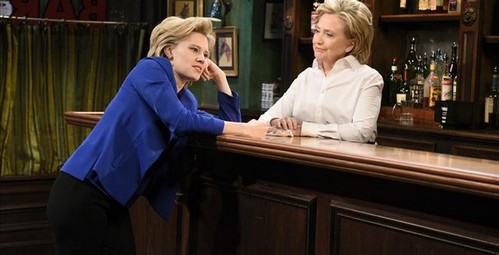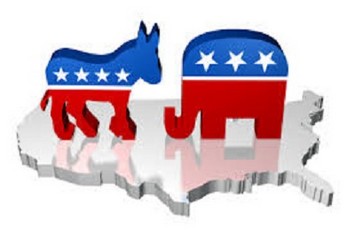‘Saturday Night Live’ Donates to Hillary’s Campaign
“Lean on me, when you’re not strong, and I’ll be your friend, I’ll help you carry on.”
The Bill Withers song has been covered by countless artists, but the rendition of “Lean on Me” performed in a duet last weekend on the season premiere of “Saturday Night Live” had novel poignancy. It was sung by Kate McKinnon, the show’s go-to impersonator of presidential candidate Hillary Clinton, and Mrs. Clinton herself. The appearance was an integral part of the Clinton campaign’s much-touted re-re-re-rebranding push to make Clinton seem more spontaneous and relatable. And it was, by most accounts, a success.
The headline on the Daily Beast’s review summed it up well: “‘Saturday Night Live’ Premiere Basically a Hillary Clinton Campaign Ad.” And, as the Daily Beast’s senior entertainment reporter Kevin Fallon notes, it wasn’t just the skit with Clinton’s walk-on that was a gift. It was almost the whole show. The ‘SNL’ news segment took shots at potential Clinton opponent Joe Biden and New Hampshire Democratic primary front-runner Sen. Bernie Sanders. Even the inevitable potshots at Donald Trump were aimed, at least in part, at making Clinton seem like the only safe choice in the 2016 race.
And that’s fine. The First Amendment covers sketch comedy. And it’s hardly as if Clinton is the first presidential candidate or politician to take advantage of “Saturday Night Live” or some other entertainment show.

In 1968, Richard Nixon had many of the same challenges Clinton faces today. He was seen, rightly, as stiff, aloof, conspiratorial and too self-serious. That’s why he went on “Rowan & Martin’s Laugh-In” and said “sock it to me.” Nixon didn’t win the very close presidential election because of one five-second bit on “Laugh-In.” But he probably wouldn’t have won if he hadn’t followed the advice of a 28-year-old media consultant wunderkind named Roger Ailes, who helped choreograph Nixon’s image makeover, and the “sock it to me” moment was arguably the most significant part of that effort. (Note: Ailes now runs Fox News, where I am a contributor). George Schlatter, the producer of “Laugh-In,” later apologized for helping Nixon get elected.
If Hillary Clinton is elected president in 2016, I very much doubt that Lorne Michaels, the executive producer of “Saturday Night Live,” will express similar regrets.
And that’s fine, too.
Again, “Saturday Night Live” has the same First Amendment rights as The New York Times and The Washington Post But you know who else has the same free-speech rights as the mainstream media? You and me — and George Soros, Charles and David Koch, and every other citizen of the United States.
And that’s why the Supreme Court’s decision in Citizens United was correct. In that decision, the court held that everyone has the right to get their views and opinions out into the public conversation.
In the arguments before the court, the Obama administration took the position that the government could even ban books during election season if those books amounted to “express advocacy” for a candidate, even if that advocacy took the form of a single mention of a candidate.
The court rejected that argument, and President Obama, along with most liberals, have never forgiven the justices. Hillary Clinton is so opposed to the ruling, she has made amending the First Amendment a cornerstone of her campaign.
Why do liberals hate Citizens United so much? No doubt there are many explanations, but one seems particularly obvious. In a world where only powerful institutions in the mainstream media have an unfettered right to make their case during elections, then the conversation is going to go in their favor. Even if Fox News and Rush Limbaugh were the monsters liberal claim they are, the scales still lean inarguably leftward when you include the biggest newspapers, the major TV networks, National Public Radio, and popular programs like “The Daily Show” and “60 Minutes.”
None of these outlets would consider their editorials, news coverage and comedy sketches to be “in kind donations,” but from the perspective of political campaigns, that’s a distinction without a difference. Because Democrats understand that when they’re not strong, they can lean on their friends to help them carry on.
